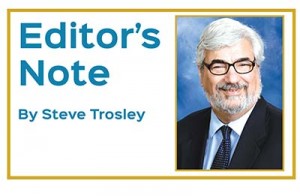Tools for savvy millennial faithful citizenship
 It’s one of those infamous dinnertime phone calls.
It’s one of those infamous dinnertime phone calls.
“Hello, Steffen, this is Travis at Marketing Research Associates. You’ve been identified as an opinion leader and we value your opinions. I would like to ask you a few questions.”
If you’re a registered voter and have a landline listed in one of those charming anachronisms known as a telephone directory, you may get a call like this. If you don’t want any more of them, you should respond like I do:
“First, I do not know you, Travis, so I prefer that you call me Mr. Trosley, especially since you’ve mispronounced my first name, and I have questions for you. For all I know, you could be Lois Lerner, calling for the IRS to collect self-incriminating statements from me. Lastly, would you care to put a number on the value of my opinion to your organization?”
Travis is momentarily quiet then asks, “A number?”
“Sure, your firm is going to make money off of my valuable opinion and I want a piece of the action. That’s only fair. So how much are you paying for this session?”
Click. And I doubt I will hear from Travis again. Travis earns a living as a pollster and polling is one of the tools of modern journalism.
As we continue to discuss faithful citizenship this 2016 election season, we should discuss some of the tools citizens should cultivate, such as understanding the media filters through which you get your information. Always do this prayerfully. I use the prayer to St. Michael the Archangel.
Reporters often preface questions, I suspect because they don’t have enough confidence in their command of the language to pose a straightforward inquiry, so you will hear something like this: “Polls show such-and-such. How do you reconcile that with your position on…”
What polls? When were they taken? Who took them? How are the questions constructed? Since there’s so much information missing, how can anyone give an accurate response? Thus, the candidate or official now knows the reporter really doesn’t know much about the subject and is just looking for a quote for his or her story.
“Some say…, people I talk to are saying… some of my sources tell me …” Who is this unnamed some? What people do you talk to? Other reporters? Your spouse or significant other? Your pet Labradoodle? And of course you’re going to tell me you have to protect your sources, so we don’t know if you really have a basis for this question or if the opposition candidate fed it to you.
When you read “sources close to the” whatever, that usually means the story was leaked or came from an insider tip, which almost always means someone wants the information out there for some self-serving reason.
When I was working for a northern Ohio newspaper, I met two reporters from New Jersey at a lunch session. When they found out where I was from, they asked me if George W. Bush would do well in Ohio. I told them I thought he would beat John Kerry in Ohio and they proceeded to tell me I was wrong because they had seen polls – internal polls (those taken by the candidates’ campaign organization) at that – and they showed Kerry clearly winning. I asked them if they had ever been to Ohio. They had not. I responded that I had been there. And Bush won the state in that election.
Steve Trosley is editor and general manager of The Catholic Telegraph.
This Editor’s Note column first appeared in the April 2016 print edition of The Catholic Telegraph.













